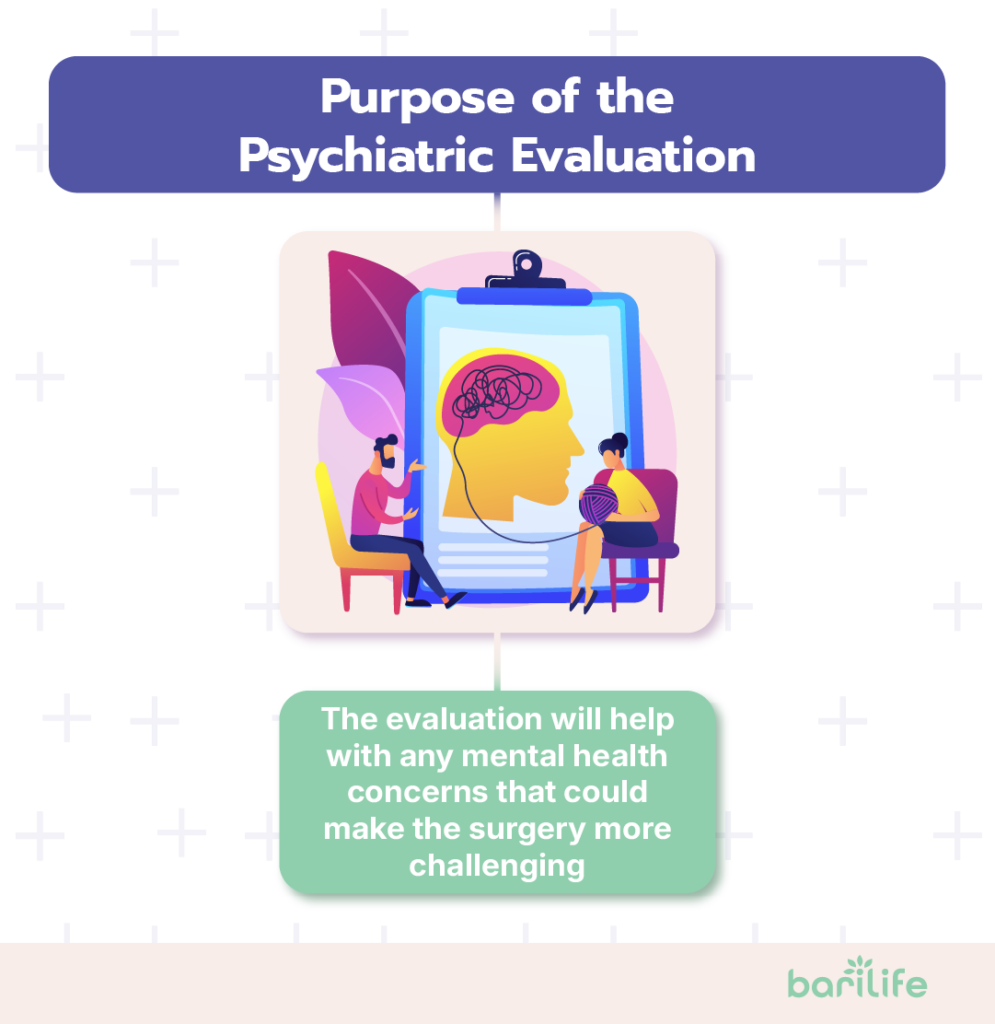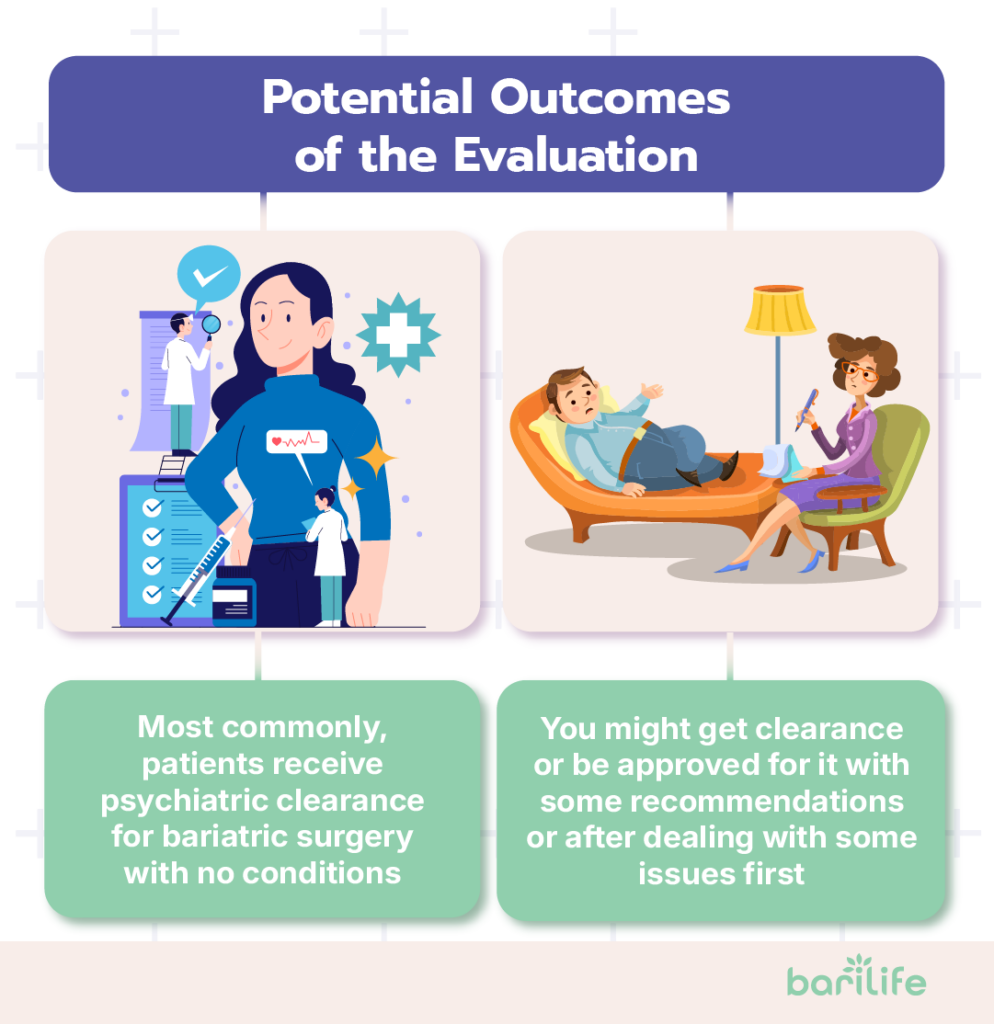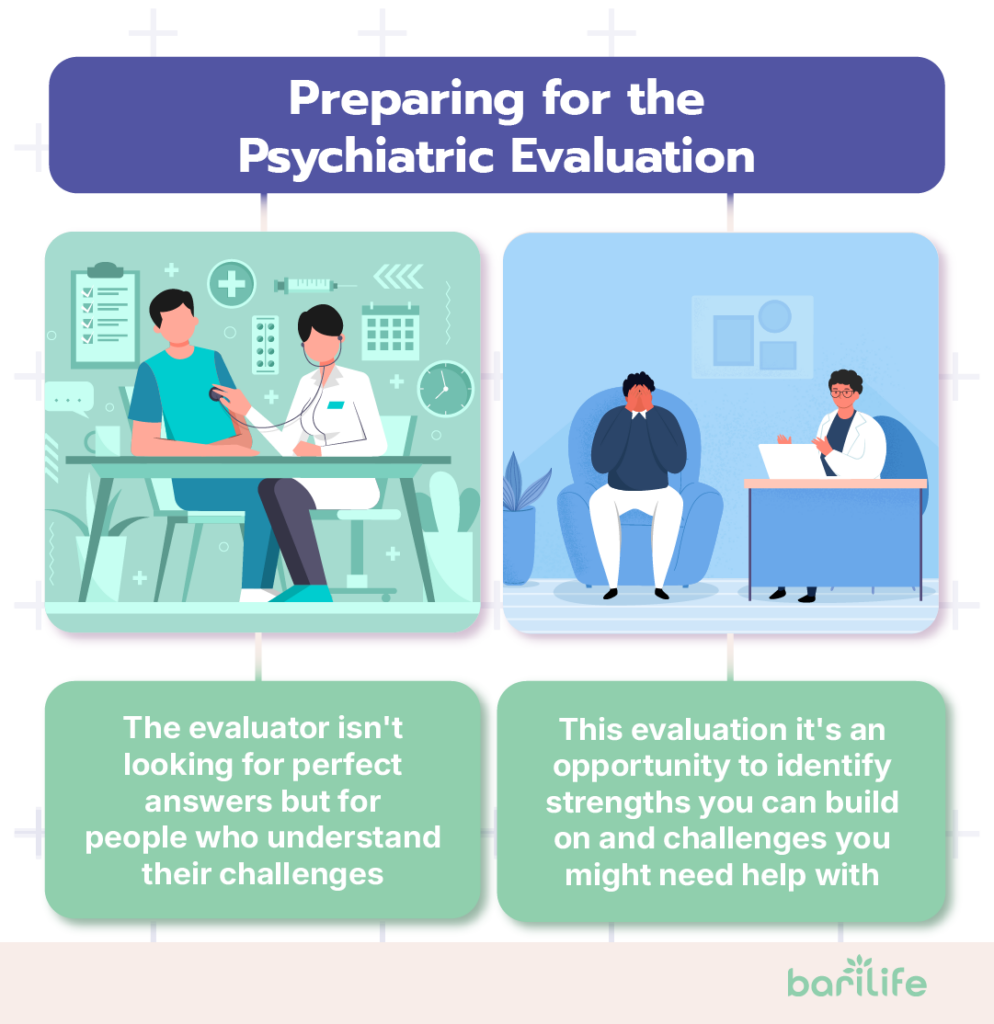Key Takeaways
- A psychiatric evaluation is a standard and supportive part of the bariatric surgery process, designed to ensure you are mentally prepared for the lifestyle changes ahead.
- The evaluation assesses your mental health, eating behaviors, stress management skills, and support system to identify any areas needing additional support before surgery.
- Being honest and open during the evaluation helps create a personalized plan for success, increasing your chances of achieving and maintaining your weight loss goals.
If you’re considering weight loss surgery, you might be surprised to learn that a psychiatric evaluation is a standard part of the process.
While this can sound intimidating, you should know that this evaluation is to actually help ease your concerns and prepare you for your bariatric surgery journey.
Table of Contents
Purpose of the Psychiatric Evaluation

Weight loss surgery isn’t just a physical change—it requires significant lifestyle adjustments and can bring on complex emotions. The evaluation will help with any mental health concerns that could make these adjustments more challenging.
Insurance companies also typically require this evaluation before approving surgery, but more importantly, it’s a valuable tool for helping you prepare mentally for the journey ahead.
Additionally, what tests are done before bariatric surgery often include psychological screenings, nutritional assessments, and medical evaluations to ensure a safe and successful procedure.
Components of the Psychiatric Evaluation
When you go for your psychiatric evaluation, you’ll meet with a mental health professional—usually a psychologist, psychiatrist, or licensed therapist with experience in bariatric care. This meeting typically lasts 1-2 hours and involves a detailed conversation about various aspects of your life and health.
You’ll discuss your weight history and previous weight loss attempts, including what worked, what didn’t, and how you felt during those experiences. The evaluator will ask about your relationship with food and your eating patterns, including whether you use food to cope with emotions, experience binge eating, or have other eating behaviors that might affect your post-surgery success.
The mental health professional will explore your understanding of the surgery, including the required lifestyle changes, potential complications, and how your life might change afterward. They want to make sure you have realistic expectations and understand what you’re committing too.
You’ll also talk about your support system—the friends, family members, or others who can help you through recovery and the following lifestyle changes. Having good support improves outcomes after surgery, so this is an important part of the conversation.
In addition to the interview, you’ll likely complete some questionnaires that screen for conditions like depression, anxiety, and eating disorders. These standardized assessments help the evaluator get a more complete picture of your mental health.
Common Psychological Conditions Assessed
During your evaluation, several areas of mental health are typically assessed that could impact your success after surgery.

Mental Health
Depression and anxiety are common in people seeking bariatric surgery. These conditions don’t mean you can’t have surgery, but they might need to be well-managed beforehand. After significant weight loss, some people are surprised to find that their depression doesn’t completely disappear, so it’s important to have coping strategies in place.
Disordered Eating Patterns
Eating disorders or disordered eating patterns are carefully evaluated. Binge eating, emotional eating, and night eating can all become problematic after surgery when your eating habits must change dramatically. The evaluator wants to help you develop healthier relationships with food before surgery.
Substance Misuse
Your history with alcohol or substances will be discussed, as some research shows that bariatric surgery can change how your body processes alcohol, potentially increasing alcohol misuse for some people.
Stress Management
The evaluation will also look at your ability to cope with stress and follow through with health recommendations. After surgery, you’ll need to follow a specific diet, take vitamins consistently, and make permanent lifestyle changes. Your ability to cope with and stick to these changes is crucial to your success.
Past Experiences
If you’ve experienced trauma, especially if it’s related to your weight or body image, this might be discussed as well. Rapid weight loss can sometimes bring up unexpected feelings related to past experiences.
Potential Outcomes of the Evaluation
After completing your bariatric psychiatry evaluation, you’ll typically receive one of several possible outcomes.
Most commonly, patients receive psychiatric clearance for bariatric surgery with no conditions. This means the evaluator found no psychological concerns that would interfere with your success after surgery.
Some patients are cleared for surgery with recommendations for additional support. You might be encouraged to attend support groups, work with a therapist on specific issues, or develop particular coping strategies before or after surgery.

Less frequently, the evaluator might recommend addressing certain issues before proceeding with surgery. This could involve getting treatment for depression, working on binge eating behaviors, or demonstrating sobriety for a period of time. This isn’t a rejection—it’s about timing. The goal is to address these issues so you can have the best possible outcome when you do have surgery.
Very rarely, a patient might not be recommended for surgery from a psychological perspective. This typically happens only when there are serious untreated conditions that would make it unsafe or extremely difficult to follow the necessary post-surgical guidelines.
Impact of Psychiatric Evaluation on Surgical Success
Research consistently shows that addressing psychological factors before surgery improves outcomes afterward.
Patients who receive appropriate mental health support when needed tend to lose more weight and maintain that weight loss longer. They’re better prepared for the emotional challenges that can come with dramatic body changes and the attention from others that often follows.
The psychological skills developed through this process—like emotional regulation, stress management, and consistent health behaviors—contribute to long-term success after surgery. Learning how to manage emotions without using food, for instance, becomes crucial when that coping mechanism is no longer available after surgery.
Patients who are psychologically prepared also tend to have better quality of life improvements after surgery. Weight loss itself doesn’t guarantee happiness or life satisfaction, but having the psychological tools to adapt to your new body and lifestyle increases the chances that you’ll experience positive emotional changes along with the physical ones.
Preparing for the Psychiatric Evaluation
As you get ready for your psychiatric evaluation, the most important thing to remember is to be honest. The evaluator isn’t looking for perfect answers but for people who understand their challenges and are willing to work on them.

Before your appointment, take some time to reflect on your relationship with food. Think about why and when you eat, whether you use food for comfort or to celebrate, and how you feel these patterns might change after surgery.
Preparing your body for surgery with a cleanse for bariatric patients can also be beneficial, as it ensures your digestive system is in optimal condition before undergoing the procedure.
Consider your support network and who will be there for you during this journey. Who can help with practical matters right after surgery, and who can provide you with emotional support during challenging times?
Reflect on your reasons for wanting surgery. Going beyond “I want to lose weight” to deeper motivations like improving health conditions, increasing mobility, or enhancing quality of life can help demonstrate your understanding of the procedure’s purpose.
Be prepared to talk about any past or current mental health treatment honestly. If you’ve worked with therapists or taken medication for psychological conditions, this history helps the evaluator understand your mental health needs.
Remember that this evaluation isn’t a test you pass or fail. It’s an opportunity to identify strengths you can build on and challenges you might need help with. Think of the evaluator as part of your team, working toward the same goal—your successful outcome after surgery.
Conclusion
The psychiatric evaluation for bariatric surgery is an important part of preparing for this life-changing procedure. By identifying potential psychological challenges early and connecting you with appropriate support, the evaluation helps ensure you’re not just physically ready for surgery but emotionally prepared as well.
Approach this evaluation with honesty and openness, and view it as an opportunity to strengthen your preparation for the journey ahead. With the right mental and emotional tools in place, you’ll be well-positioned for success after your bariatric surgery.
How Bari Life Can Help
Bari Life offers a range of bariatric vitamins and supplements designed to support your nutritional needs before and after surgery, ensuring you stay on track with your health goals. Their products include bariatric multivitamins, bariatric vitamins chewable, and a bariatric multivitamin with iron, all specially formulated to prevent deficiencies and promote long-term success.
In addition to essential vitamins, Bari Life provides bariatric protein shakes and bariatric protein bars to help meet your daily protein intake. If you’re looking for nutritious snack options, they also offer bariatric snacks that support a balanced diet.
For those needing additional support, Bari Life features bariatric calcium chews for bone health, a bariatric probiotic to aid digestion, and even a liquid bariatric vitamin for those who prefer an alternative to pills. They also offer specialized bariatric vitamins for hair loss, ensuring you maintain optimal health in every aspect of your journey.

Visit Bari Life today to explore their trusted supplements and take the next step toward a healthier you!
If you want to learn more, why not check out these articles below:
Resources
Eating Disorders and How They Intersect. (2022). Baylor College of Medicine.



What are your tips and tricks to post-bariatric success?